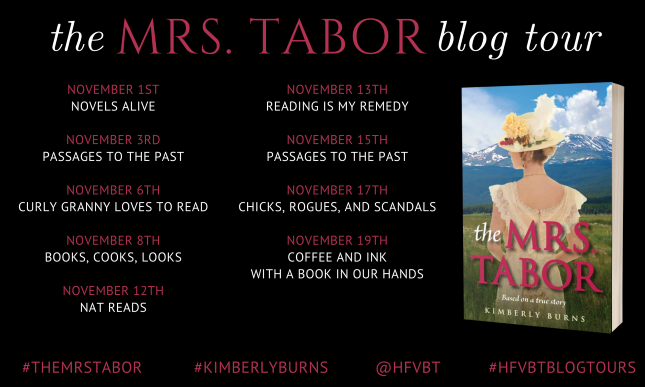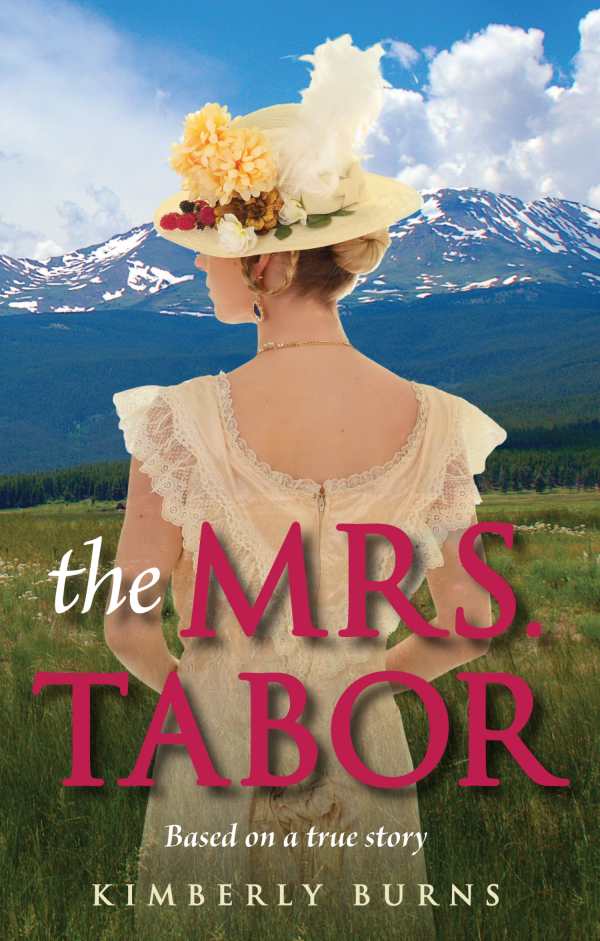 Book groups aren’t just for nerds anymore. Since Oprah started her book group in 1996 (Deep End of the Ocean by Jacquelyn Mitchard, for the trivia buffs) movie stars and television hosts have been lining up to tell fans what they are currently reading.
Book groups aren’t just for nerds anymore. Since Oprah started her book group in 1996 (Deep End of the Ocean by Jacquelyn Mitchard, for the trivia buffs) movie stars and television hosts have been lining up to tell fans what they are currently reading.
I have been a member of several book clubs over the years and now visit groups to discuss my novel, The Mrs. Tabor. Book discussion groups come in many different forms, and there is no one proper type of book club. But I have learned there are three elements needed for a successful, happy book group: Pick a good book, get everyone involved, and have questions prepared in advance.
Picking a good book should be easy–there are millions of books out here. Keep these things in mind when narrowing down the unlimited options.
It has to be doable, short enough so that members can finish the book by meeting night. Not everyone will finish every book on time. Encourage them to come anyway, knowing that plot spoilers may be revealed. Readers usually have a feel for the tone, setting and characterization within the first hundred pages and can contribute to that part of the discussion. And isn’t socializing part every group’s mission?
Books that stimulate conversation include:
- Complex plot: I read there are only three plots– man verses man, man verses nature, man verses himself. Hmm, maybe; it bears discussion. But I think in reality and well-written fiction that multiple plot lines can exist in a single life and will grow a character. Which leads me to my next point …
- Developed characters: No one is all good or all bad. Even heroes can have a moment of weakness or a flaw. We are still talking about Achilles and his heel after 2000 years. Villains are more interesting if we think they have either an understandable motive or some glimmer of redemption.
- Complicated conflicts: discussion will take off if the characters have no clear right answer or easy path. Sometimes we make sacrifices to achieve a great goal. Sometimes the right thing to do can hurt other people.
- Relatable topics: Readers can see themselves in even in the most imaginative fiction. Book group members can share how they felt or acted in a similar way to characters who are vastly different from the reader’s reality. My current group read the fantasy The Midnight Library by Matt Haig. None of us had ever thought of suicide or had a near-death experience, but we had a long talk about personal regrets and chosen paths taking unexpected turns. As a young professional woman (several years ago) I read a book about Sacajawea. As the only woman in the office, I could relate to the Native American guide to Lewis and Clark working with a group of all men.
- Social commentary or controversial subjects: Now days, reading a book about a current contentious topic could either lead to loads of discussion or shut it down completely. Personally, for the past couple of years I have been reading to escape the tension of the real world and have little desire right now to handle a hot potato. I have spoken to so many women who have recently left their book groups because of political differences. It breaks my heart. There is no personal growth nor development of empathy when discussion groups become echo chambers of their own opinions. It is not necessary to shy away from difficult subjects. But insist that all members be respectful of the thoughts, feeling and opinions of others. Let everyone speak. No interruptions, no insults, no shouting.
Getting everyone involved in the discussion does not require great social skills, but simply awareness. Group dynamics follow a predictable pattern. There will always be a few chatterboxes and some quieter listeners. Often a natural leader will evolve, sometimes due to their personality or subject matter expertise.
I have found that having an informal facilitator–or hostess, if you prefer– with prepared questions (more on that later) keeps the conversation moving and ensures all have a chance to speak. Throwing a question out to the group at large can result in blank stares. I start my discussions by asking an open-ending question about participants’ general impression of the book, such as ‘what was your favorite part?’ I will ask the question of a specific person, someone I know is not the most reserved nor the most opinionated and then travel around the group, calling on people by name. A good group coordinator will notice who is reluctant to share and ask that person a question she will be comfortable answering. I suggest club members take turns hosting, with either the host choosing the book or the group voting on the next book. Of course, all of this is easier with a small group, between 10-20 participants
Some book groups have themes or a preferred genre. There are pro and cons to having such a focus. Serving theme-related food, wearing period costumes or decorating like a book’s setting can add to the fun. Frankly, it seems like a lot of work to me, and a theme-driven book groups will lose members who can’t keep up with the pressure to outperform the last meeting.
Recommendations for good books can come from anywhere. Many groups refer to best seller lists from the New York Times and USA Today. Amazon lists their top 20 most sold books each week, as well as editors’ picks. Local librarians are a treasure; they love to suggest books. Even the government has reading recommendations. Each year, the Library of Congress’ OneBook Project aims to have everyone in a vicinity read and talk about the same book.
Groups that only read a specific genre for not for me. However, the people who join these groups love them, as they are always reading something of interest. I like to read a variety of books, and am pleased when I enjoy a book that I would never have picked up on my own. That is my preference, but there are no right answers. Speaking of answers …
Prepared questions should be used as discussion starters or guidelines. They are not test questions. No one has to prove they read the book.
Authors sometimes include discussion questions at the back of their books. Publishers often post questions for their new releases on the publishing house website. But don’t worry if questions are not readily available for the book your group has chosen. Just Google generic book discussion questions. LitLovers.com and morristownbooks.org have good suggestions for generic fiction questions. I have put together a few of my favorite questions have can be used for any book.
- What was your favorite part? What scene stuck with you?
- What did you think of the characters? Did they grow or change by the end? What do you think was the main character’s motivation?
- What did you think of the dialogue? Was it true to character? Easy to understand? Did it add depth to the characters?
- Was the plot engaging? Would you describe it as fast-paced or a slow burn? Predictable or complicated?
- Discuss the book’s structure. How would you describe the writing style? Did the structure or style make a difference in your enjoyment of the book?
- What was your favorite quote? Where there passages you found insightful?
- How did you like the ending? Would you change it? If so, how?
- If the book were a movie, who would play the main characters?
- Think of a playlist to describe this book.
There is a book discussion group for everyone. If you are having a hard time finding your tribe of readers, I encourage you to start your own book group. It usually begins with the simple question, “What are you reading?”

Publication Date: September 10, 2021
 The laws of survival always trump the rules of etiquette.
The laws of survival always trump the rules of etiquette.
Every age has its iconic blonde bombshell. In the 1880s, it’s Baby Doe, America’s original gold digger. At a time when genteel ladies could politely starve to death, Baby Doe seeks her fortune the best way she knows how-marrying a rich man. She joins the rush to the Colorado silver bonanza and meets millionaire mine owner Horace Tabor. Baby Doe enjoys the high life as his paramour, but Tabor’s wife and his business manager plot to get rid of the new girl. Baby Doe, however, has schemes of her own to upend Horace’s old relationships and become the one and only Mrs. Tabor.
But fate sweeps in and avalanches Baby Doe’s dreams. What price will she pay for becoming The Mrs. Tabor?
Based on a true story, The Mrs. Tabor seduces with a scandalous tale of love and fortunes found and lost.
“A thoughtful, immersive, and deeply human look at one of history’s most famous social climbers.” – Kirkis Reviews


 Enter to win a copy of The Mrs. Tabor by Kimberly Burns!
Enter to win a copy of The Mrs. Tabor by Kimberly Burns!
The giveaway is open to the US only and ends on November 19th. You must be 18 or older to enter.

 Kimberly Burns grew up in Colorado hearing stories about the colorful characters of the Old West. She has a degree in journalism from the University of Colorado and a Masters in Organizational Behavior from the University of Hartford. While honing her skills writing dry corporate material, she indulged her passions for fiction, American history and storytelling at numerous book groups. Kimberly lives with her husband in northern Virginia.
Kimberly Burns grew up in Colorado hearing stories about the colorful characters of the Old West. She has a degree in journalism from the University of Colorado and a Masters in Organizational Behavior from the University of Hartford. While honing her skills writing dry corporate material, she indulged her passions for fiction, American history and storytelling at numerous book groups. Kimberly lives with her husband in northern Virginia.
The Mrs. Tabor is Kimberly’s debut novel. Her next book tells the story of Denver’s most successful madam, Mattie Silks. A member of the Historical Novel Society and Women Writing the West, Kimberly is available to discuss her novel with book groups in person or online.
Feel free to contact her at www.kimberlyburnsauthor.com

Monday, November 1
Guest Post at Novels Alive
Wednesday, November 3
Review at Passages to the Past
Saturday, November 6
Review at Curly Granny Loves to Read
Monday, November 8
Review at Books, Cooks, Looks
Friday, November 12
Review at Nat Reads
Saturday, November 13
Review at Reading is My Remedy
Monday, November 15
Interview at Passages to the Past
Wednesday, November 17
Guest Post at Chicks, Rogues, and Scandals
Friday, November 19
Excerpt at Coffee and Ink
Review at With a Book in our Hands

















Thank you for hosting the tour!
Amy
HF Virtual Book Tours
You’re so welcome! What a great guest blog! 🙂
Fascinating story of ambition and resilience! Just as Baby Doe navigated the treacherous waters of social climbing and fortune-seeking, navigating the complexities of buying a home can be equally challenging. One often overlooked yet crucial factor is the septic inspection. While it might not be as glamorous as gold mining or high society, understanding the septic inspection cost is essential for ensuring that your new property doesn’t come with hidden issues. Just as Baby Doe’s journey had its risks and rewards, investing in a septic inspection cost! can safeguard your investment and ensure a smoother transition into your new home. Thanks for sharing this compelling historical narrative!
Unlock the secrets to a successful book group with Kimberly Burns’ latest guide. For an immersive reading experience, pair your book discussions with a top-notch gaming monitor. Enter our giveaway for a chance to win exciting prizes!